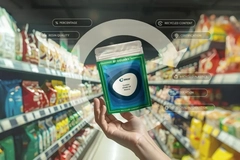Inside world’s first bio-paraxylene bottles with Suntory’s senior general manager for sustainability

Suntory Group, a Japanese beverage company, is introducing PET bottles made from used cooking oil, known as bio-paraxylene. This innovation is said to mark the first commercialized use of bio-paraxylene in PET bottle production and is expected to reduce CO2 emissions compared to bottles made from conventional petroleum-based materials.
The company will begin introducing approximately 45 million bio-based PET bottles for select beverages this month and has plans to expand the rollout across its portfolio.
Takashi Hirano, senior general manager for Sustainability Management at Suntory Holdings, tells Packaging Insights: “We believe this technology will be one of the effective options for the Suntory Group to achieve its Environmental Targets 2030, which include making all PET bottles ‘100% sustainable.’”
Power through partnerships
Suntory Group has been incorporating plant-derived MEG in its Suntory Tennensui brand since 2013.

Last September, the company partnered with Eneos Corporation to collect used cooking oil in Japan. The partnerships enabled Suntory to procure bio-naphtha, a precursor to bio-paraxylene, which can be obtained through the production of sustainable aviation fuel (SAF).
サステナビリティ経営推進本部 部長 平野 隆之(たかし)(3).jpg) Takashi Hirano, senior general manager for Sustainability Management at Suntory Holdings.“By establishing a new supply chain for the production of bio-PET, we have also enabled a stable procurement scheme of bio-PET for ourselves,” says Hirano.
Takashi Hirano, senior general manager for Sustainability Management at Suntory Holdings.“By establishing a new supply chain for the production of bio-PET, we have also enabled a stable procurement scheme of bio-PET for ourselves,” says Hirano.
This advancement is attributed to the company’s collaboration with Mitsubishi Corporation in managing the entire supply chain. Across the sector, there is a growing emphasis on partnerships with aligned values and goals to collectively drive a greater positive impact.
As SAF manufacturing increases, Suntory Group is considering making bio-based PET bottles using bio-naphtha domestically produced at Eneos Corporation’s SAF plant, which plans to start its operations after 2027.
Policy for sustainable growth
Suntory Group’s corporate philosophy is to “inspire the brilliance of life, by creating rich experiences for people, in harmony with nature.” The group’s plastic policy, established in 2019, outlines the objective that by 2030, all PET bottles used globally will be made from recycled or bio-based materials, eliminating virgin petroleum-based plastics.
“By advancing our ‘Suntory Group Plastic Policy,’ we can contribute to enhancing the transparency of our supply chain. Suntory Group aims to switch all the PET bottles used globally for Suntory products to be made of recycled or bio-based material by 2030, achieving zero use of virgin petroleum-based materials,” says Hirano.
The company is also actively collaborating with stakeholders to develop efficient recycling systems tailored to the specific needs of each country where it operates.
“Additionally, Suntory is reducing the amount of plastic used by changing the design of containers and packaging and looking for the introduction of alternative containers that do not negatively impact the environment to effectively utilize resources. We are also investing in innovation for materials and processes that improve the recycling rate and minimize environmental impact,” he adds.
To date, the company has embraced a 2R+B (Reduce/Recycle + Bio) strategy that has shaped its packaging initiatives. This approach includes reducing the weight of PET bottles, caps and labels and fostering “bottle-to-bottle” horizontal recycling in collaboration with over 100 municipalities and more than 40 companies in Japan.












